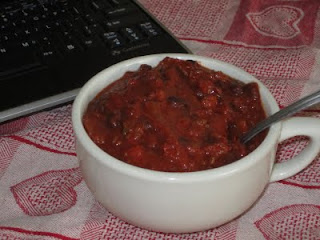
I often find pictures of my hands and my quesadillas on market shoppers' blogs when I idly surf the internet, procrastinating from more urgent tasks. I've even found recipes and calorie counts. Or I'll learn on Twitter that a seasonal vegetable has finally shown up at the farmers' market. Sometimes I'll find the answer to a perplexing question like how to cook cardoons by typing into a search engine.
Today it's easier than ever to access basic culinary information over the internet. But this trend of blogs, websites, and social media is really just the most recent chapter in a story about food and communication technologies that goes back at least as far as the invention of writing.
The earliest written recipes were inscribed on ancient Babylonian tablets. They contain instructions for preparing different types of broths and meats. Cooks and scribes set down this information at a time when it was new and exciting to store learning in a format that could be deciphered by anyone with access to the code. These cooks and scribes must have belonged to the cultural elite, those who knew how to read and write.
The English sociologist Jack Goody wrote a great book called Cooking, Cuisine, and Class, in which he ruminated on the differences between cultures that have a haute cuisine, or a more complex and varied eating style for the upper classes, versus cultures where ordinary folk and their richer compatriots eat basically the same foods, only the wealthy eat more of them. He concluded that cultures with haute cuisines tend to have written traditions while cultures with simpler food systems are more likely to communicate general and culinary knowledge orally.
Ancient Babylonian had perhaps the earliest haute cuisine, that is, it included a body of knowledge that was the province of sophisticated professionals. The ability to preserve information in writing to share with fellow experts and future generations gave the craft of cooking a platform and a reference point, a medium to store and accumulate nuggets of knowledge.
Down the line, the invention of the printing press eventually turned cookbooks into household items. Naturally, the first cookbooks were written by rich folks for rich folks, but eventually more cookbooks were written, and they became more widely available. By the time a few centuries had passed, a typical housewife could get her hands on a basic cookbook geared specifically for a typical household.
Despite the staggering amount of information that we now have available about food via the internet, we really don't have any idea of how this technology will ultimately affect the way we cook. On the one hand, we're able to watch videos about simple things like how to peel a carrot, while we can also learn obscure arts such as how to make tempeh or recreate medieval trenchers.
At its worst, this vast storehouse of food knowledge has the potential to be confusing and unduly complicated, discouraging would-be cooks seeking simple, accessible information. At its best, it can be a powerful tool for healthier, happier eating. Time will tell where it's all heading. In the meantime, I'm going to go peck around for some ideas on how to use those donut peaches I just picked up at the market.

No comments:
Post a Comment